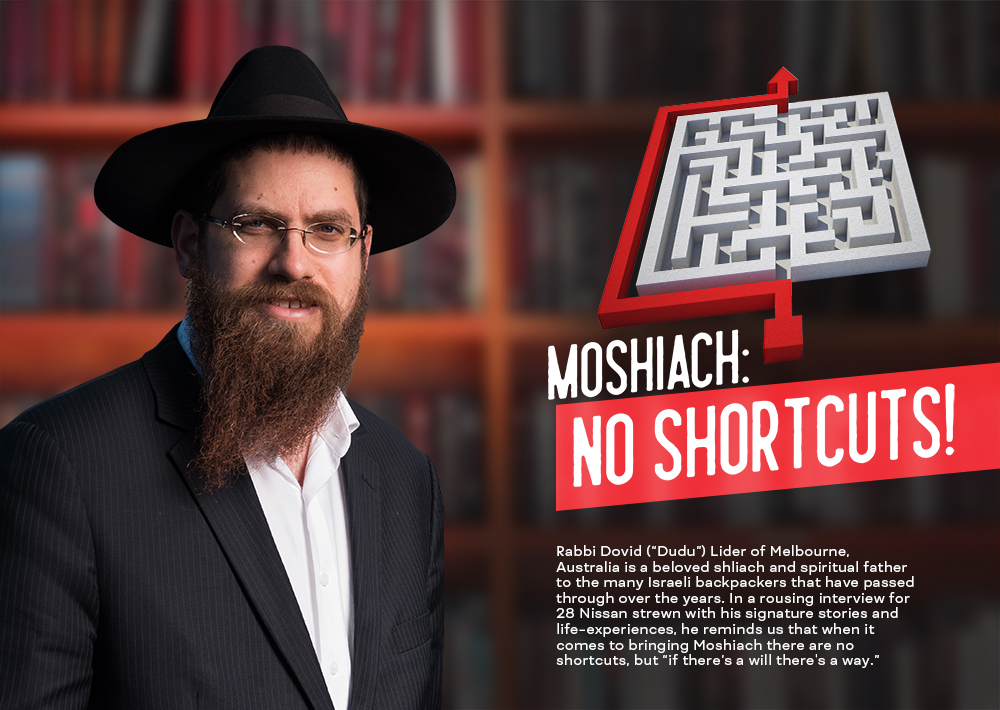Moshiach: No Shortcuts!
Rabbi Dovid (“Dudu”) Lider of Melbourne, Australia is a beloved shliach and spiritual father to the many Israeli backpackers that have passed through over the years. In a rousing interview for 28 Nissan strewn with his signature stories and life-experiences, he reminds us that when it comes to bringing Moshiach there are no shortcuts, but “if there’s a will there’s a way.” • By Beis Moshiach Magazine • Full Article
Menachem Ziegelbaum, Beis Moshiach
Rabbi Dudu Lider and his family work year-round with Israeli tourists who visit distant Australia. Although life has not returned to normal, that does not mean that outreach has diminished; on the contrary. Even without public Sedarim last year, their work was greater than usual.
Why?
Because we prepared kits that we sent to Jewish families. We put in all the simanim of the Seder; matzos, a cup, wine and grape juice, a Haggada and a brochure that explains how to conduct the Seder. There were hundreds of families on their own and people who live alone all the time, to whom we sent hot meals for Pesach including a nice dessert. There were Jews who never participated in our programs who, this time, wanted us to send them a kit. I can tell you that our outreach efforts made waves all the way to Eretz Yisrael where there were items in the papers and on big news sites about what we did.
Also, via Zoom we showed how to conduct a proper Seder.
Can we talk about Chof-Ches Nissan?
Since this was a farbrengen and not a formal interview, R’ Lider did not wait for my questions. He started as follows:
“We once had an Israeli tourist here by the name of Itzik who visited the Chabad House. He told me about a dream he had. What was the dream? He wanted to go on a long trip to several places with the highlight being Manhattan where there is a very exclusive nightclub. He dreamed of arriving at this nightclub at two in the morning and then in the morning, returning right back to Eretz Yisrael.
He followed through with his itinerary and ended in Manhattan. It was two in the morning, just as he planned, when he arrived at the nightclub but at the entrance he was stopped by a guard. He was told that you do not enter this exclusive nightclub without a tie.
Our Itzik was an Israeli, a sabra, and he dressed the part. What could he do without a tie? Look for an open store on Fifth Avenue? He didn’t really want to spend a few hundred dollars on a tie, however, he really wanted to get in.
After some thought, he came up with a simple solution. He went to a nearby park where he took off his socks and made them into a tie. When the guard saw the tie, it made no difference what it was made out of and to Itzik’s satisfaction he opened the door.
When I heard this story I learned the power of ratzon. When you really want something, you find a way to get it, “where there’s a will, there’s a way.”
The HaYom Yom (9 Elul) brings a powerful statement from the Rebbe Maharash. There could be a situation in which people of weak intellect make an argument that comes from the depths of their heart and on this claim, Tannaim and Amoraim (who, with their great holiness can resurrect the dead!), geniuses and men of great intellectual prowess discuss what precisely is meant by this claim, did they mean this or that. Says the Rebbe Maharash, “Yet this woman is far removed, intellectually, from being able to devise such (ingenious, brilliant) claims. But the truth is that when a subject is of deep concern to a person, even those of weak intellect will come up with profound concepts.”
How does that connect with our subject?
When you examine the sicha, you see that the Rebbe presents two main points of wonder/dismay: The Rebbe expresses his disappointment that not enough was done to bring Moshiach. How is it possible that all the thousands of shluchim and tens of thousands of deeds done over the years to hasten the Geula, did not make it happen? (“It arouses the greatest shock: How is it that notwithstanding everything – the coming of Moshiach Tzidkeinu was not yet accomplished? … It is not at all understandable!”).
Another wonder that the Rebbe presents is: “Many tens of Jews gather and despite this they do not make a commotion to effect Moshiach’s coming immediately; it is not out of the question for them, r’l, that Moshiach won’t come tonight, nor tomorrow, nor two days from now, heaven forfend!”
In other words, it’s like the Rebbe is saying to us: When that fellow wanted to enter the nightclub, he found a way to get in. When those of weak intellect wanted to present their claim, they found arguments that even the greatest minds had to contend with. Why? Because they cared; they really cared.
The same is true for you, says the Rebbe. The time has come for you to really want to find a way to get out of your inner galus in avodas Hashem and start crying out, sincerely, “ad mosai.” But what happens? There’s a problem! You want the Geula only because the Rebbe told you to and not because you really want it. The Rebbe wants our asking for the Geula to be genuine.
I’d like to understand, once and for all, is there really not a single person who genuinely asks for the Geula?! Let’s take a current example, of someone on a ventilator because of corona, whose life is in danger. Don’t his family members truly want Moshiach?
I will tell you something personal. My father a’h died after a serious illness. I once discovered a medical issue on myself that suddenly made me afraid. Actually, I panicked. I googled it and, as always, my phone battery was used up. Two minutes went by that seemed like forever until I connected my phone to a power source and was able to find out that what I had seen was nothing. It had no medical significance but I can tell you that during those two minutes nightmare scenarios flashed through my mind. In those two minutes I realized that I would be bringing the Geula since I had no other choice.
That does not mean that I want the Geula, just that I was forced to want it. That’s called asking for the Geula “because you were thus commanded.”
One of our supporters, a businessman named Eliezer, once said to me, “People who are successful in business are people who are involved in the things that are important, not the things that are urgent.” He explained: It is man’s nature to deal with the urgent things which is why, sometimes he is not successful because he keeps bouncing back and forth between urgent and panicked. The successful ones are those who deal with the important things but not the urgent things; although they do not have outside pressure creating urgency they push themselves to deal with the important things in a timely way.
In the maamar “V’Ata Tetzave,” the Rebbe explains that a Jew needs to reach a state of “crushed” and not as a result of external crushing. We need to stop crying out “ad mosai” because we were told; the cry needs to come from us, because we really care.
Can you please elaborate on this point?
The Rebbe wants us to be partners in the journey and mission to bring Moshiach and not just because we are required or because it is being asked of us. When a Jew feels that Geula is his thing and that he is a partner in this mission, then he cries out sincerely.
I come across letters in Igros Kodesh in which the Rebbe advises someone about problems involving children and youth and he often tells parents or educators to give responsibility to children. They should be counselors or activists. What’s the idea? When a child takes responsibility he becomes a partner, he becomes a part of things and won’t push back. When a weak-minded individual wants something, he comes up with deep and impressive arguments that are completely beyond his intellectual abilities. Why? Because it’s part of him.
So too here; the Rebbe wants the job of bringing the Geula to be our responsibility and he tells us explicitly, “The only thing that I can do is give it over to you; do all that you can.”
Then you’re saying that we don’t want to get out of galus enough, we don’t feel like partners, and that’s why Moshiach is delayed. But anyone can give you 101 reasons why he really does want to get out of galus!
I’ll give you an example from sports. There are athletes who show up for the training regimen their coach has prepared for them. Then there are athletes who show up early in the morning, long before the official time, and they begin training. Why do they do that? True, there is honor, celebrity and success, but there is a deeper reason.
Chassidus explains that there are five levels of the neshama: When we do something on the level of “nefesh,” this is the lowest level, the level of action. However, there are higher levels which are the “engine” that produces our actions. When we do something, it’s because our emotions push us to act. What is the “engine” of the emotions? The brain. What is the “engine” of the brain? Ratzon, transcendent will and desire. And above ratzon? Taanug (delight, pleasure) which causes a person to want and to act as he does in order to actualize his pleasure.
Every person wants to experience pleasure starting from a child who wants chocolate after having tasted it for the first time in his life to adults who will turn the world over in order to obtain the fulfillment of their desires.
When a person does something only because he has to or because he was told to, he doesn’t really want it. The moment a person is driven to act by his own taanug, nothing can stop him from obtaining it. This is why an athlete will rise at five in the morning and begin training. There is glory in it but above all else, he has pleasure from it and for that pleasure he will do everything.
In the sicha of Chof-Ches Nissan, the Rebbe changed the approach; you can no longer suffice with avoda done with kabbolas ol, because you were told. It just won’t work anymore. We have reached the point where we Chassidim need to be partners in creation and everyone, men, women, and children have a personal responsibility to bring the Geula. This is precisely what the Rebbe did with the sicha, “The only thing that I can do is give it over to you,” because only someone who feels invested can feel the tremendous responsibility.
Since that night at the end of Nissan 5751, there has been nobody who feels the responsibility and is ready to take responsibility?
At that time, Rabbi Chaim Gutnick of Australia wrote to the Rebbe asking what, precisely, the Rebbe meant. What could he do to help hasten the Geula. By way of response, the Rebbe asked that he be sent the sicha that was said the following week, Shabbos parshas Tazria-Metzora, when the Rebbe spoke about learning inyanei Moshiach and Geula.
The idea of studying inyanei Geula is deep and simple at the same time. When a person learns, the idea becomes part of him which is why he can feel the pleasure in his contribution and the pleasure leads to his taking action in a sincere way. In other words, there are no shortcuts. There is a long (and short) way before the action: learning, feeling taanug, internalizing, and taking ownership of it. Then comes action on a completely different level.
Listen to this nice vort – Chazal say that in the Future, in the second era of Yemos HaMoshiach, mitzvos will be abrogated. Yet, it says that the Torah is eternal and will not be exchanged. How do we reconcile these two statements of Chazal?
The Rebbe explains that it means that in the Future the need for a command will be abrogated, for then we will feel that we are partners and a partner does not need to be commanded to work. He works of his own volition and with delight because it’s a part of him. Therefore, his working comes from his inherent pleasure.
This is why, in the Future, mitzvos will be repealed. Not that there won’t be mitzvos, G-d forbid, but commands won’t be necessary because we will fulfill the mitzvos with a feeling of inherent pleasure and joy.
Once, at a siyum on the laws of “Shluchin v’Shutfin” in the Rambam, I heard a nice thing from Rabbi Glick here in Melbourne. He asked: What connection is there between shluchin and shutfin, between messengers and partners? He explained in his inimitable way that the ultimate level of a shliach is when he feels like a partner in the Rebbe’s work, with all his ten soul powers. He does not operate because he is a servant and he also does not operate like a messenger who delivers pizza, carrying out his mission properly; rather, he is a full partner.
By the way, this is also the secret to successful fundraising. When a shliach turns the donor into a partner in his work, the donor will open his wallet and give generously on his own, for it has become an inseparable part of him.
In our case, on Chof-Ches Nissan, the Rebbe handed the matter over to us, the Chassidim, and asked us not to cry out because we were told to, but because we feel like partners in this enormous project of bringing the Geula. It’s like the Rebbe was saying, from now on this is your business, not mine in which you’re doing me a favor.
This is how the Rebbe operated throughout the years. The Rebbe turned us into partners by sending us on shlichus, making us active participants, directors of mosdos or Chabad Houses, each in his way.
WHEN THE REBBE SAYS WE CAN, WE CAN!
How did this not happen until now?
I learned Inyano shel Moshiach by Rabbi Sholom Dovber Wolf (and this is my opportunity to call upon every Chassid to set up a chavrusa to learn this sefer which gives me pleasure and energizes me in everything connected with learning inyanei Moshiach and Geula).
[They once saw the mashpia, R’ Mendel Futerfas learning the daily Rambam early in the morning. When they asked him about this he said that it’s the Rebbe’s inyan and he wants to start the day with the Rebbe. Since hearing this story, I try to start my morning by learning inyanei Moshiach and Geula because this is the Rebbe’s inyan and I also want to start my day with the Rebbe.]
He quotes the Rambam (Hilchos Melachim 11) “that this Torah, its laws and judgments will never (l’olam) change.” The simple meaning is that the Torah is eternal. The Rebbe says: This Torah, its laws and judgments – l’olam, for the world. It can endure in this physical world even though it was hewed from a very high spiritual source, above the world. A person who says that the Torah is so exalted that it cannot be fulfilled in this world, with all the world’s coarseness, is a heretic.
The Rebbe said the same thing to us on Chof-Ches Nissan. If the Rebbe said that this matter is given over to us and we can bring Moshiach, then there is no doubt that we can do it. Otherwise, we are saying that the Rebbe’s words are not Torah given from Above, r’l.
We need to strengthen ourselves with complete trust that what the Rebbe said is correct and precise. “Yes We Can.”
I apologize for going back to the question, although from a slightly different angle. Why doesn’t it happen? What’s holding us back?
The Rebbe himself says explicitly in the sicha “What else can I do … after everything that was done until now did not help, the proof being that we are still in galus and, more importantly, in a galus pnimi (an inner galus) in avodas Hashem.”
What does this mean? You have a person who is doing what he needs to do to hasten the Geula but the problem is that he is still in an inner galus. He does things only on the level of action and not with taanug pnimi as we spoke about earlier. We do things, but on an external level and not because we really feel that we own it. The Rebbe asks, “do all that you can,” that we participate in bringing the Geula with all our soul powers even the most subtle ones, and then this will be going out of an inner galus.
A hired worker, when the work is done, packs up and goes home and doesn’t care about the business until the following day. The business owner lives with his business at night too and even dreams about it. Why? Because it belongs to him.
The Rebbe wants us to cry out in earnest. Who does that? Who does all that he can? The one who feels it belongs to him.
How can we get ourselves to feel like partners?
The Rebbe clarified this in the sicha of Tazria-Metzora, by learning inyanei Moshiach and Geula as they appear in Torah (the Rebbe repeated this time-and-again in the sichos of 5751-5752 such as Balak 5751).
There is nothing new under the sun, just the long-short way – to learn and internalize the inyan of Moshiach so that it sits well with our intellect and understanding, in our chochma, bina, daas. It’s not enough to learn it superficially; it needs to be delved into and then, when it becomes settled in the mind (Vessels of Tikkun) then the feeling of taanug and personal connection are created and from there it descends to active work, “do all that you can” and the socks are turned into a tie.
There is another condition here in the sicha, that it be “Lights of Tohu in Vessels of Tikkun.”
Yes, that is the chiddush of the Rebbe in this sicha – a big chiddush in which the Rebbe fuses opposites, Lights of Tohu but in Vessels of Tikkun. This is definitely a central point in the entire subject of bringing the Geula.
I once heard Chassidim say, as a humorous observation, that half of the Chassidim heard the words “Lights of Tohu” and half heard “Vessels of Tikkun,” and since then, these are working one way and the others the opposite way. What we need is for them to meet and talk to one another and combine the two approaches as the Tzemach Tzedek said that the achdus of Chassidim will bring us Moshiach.
And now, seriously …
The Rebbe is telling us something simple: Geula means a revelation of Atzmus which has the ability to contain opposites and connect them. Gvul and bli gvul; the connection of Above and Below; Judge and Advisor, Lights of Tohu though in Vessels of Tikkun. A simple mathematical computation: Lights of Tohu plus Vessels of Tikkun equals Geula.
Unfortunately, there are those who are in Oros and those who are hiding in Keilim but neither of them are fulfilling “do all that you can,” because what we need to do is take all the lights and put them into the most “rectified” vessels. That is the idea of Geula, the combination of opposites.
CONVEYING THE MESSAGE CORRECTLY
How can we combine opposites in our avoda?
In order to combine opposites, we need self-negation. As long as I remain in my comfort zone there is no real change because it is hard for me to forgo my comfort.
So there are people on the right and people on the left and each one remains in his place. This one finds it more comfortable for him to proclaim “Yechi” and the “Rebbe chai v’kayam,” but the same Rebbe tells us on Shabbos Parashas Chayei Sarah 5752 that our shlichus is to welcome Moshiach by “explaining Moshiach … in a way that everyone can understand including by learning inyanei Moshiach and Geula, especially in a way of chochma, bina, daas.”
There are those who quote the first part of the sentence, but in the same breath the Rebbe asks that it be according to the “intellect and understanding of every single person,” or, as the saying goes, “It’s not enough what the Jews say; it’s also important – l’havdil – that the Arabs understand.” It’s not enough to “bomb” people with Lights but to know how people are receiving the message.
Every week I sent an invitation to groups of Israelis in Australia to Friday night meals (before corona). One Friday, a few minutes after I sent out the invitation, a fellow named Rotem responded in a group text: Dudu, how long are you at the Chabad House going to transgress the sin of “bal tashchis”? Be ashamed of yourselves. You use disposable plastic at the meals thus polluting the environment and destroying quality of life.
That’s what he sent everyone. My instinctive reaction and what I started writing in response was, “You asked how long we will continue to pollute – until you donate 150 fish plates and 150 dinner plates and a dishwasher or you pay someone to come every Shabbos and wash the dishes.”
I nearly sent that text but then, a fellow from Tel Aviv named Ron walked by me. He had connected with us during that period and became a baal teshuva. I was reminded that the night before I had learned with him a letter from the Rebbe in which he explains the phrase, “b’tokef ub’noam (firmly and pleasantly).” The words seem contrary because if it’s firm, it’s not pleasant and vice versa. The Rebbe explains when words are spoken not from a place of ego but from a place of humility, then even if we say them firmly, they are said pleasantly because it’s not coming from ego or your own personal opinion but because you want what is best for the matter at hand.
I asked Ron to read my response before I sent it. He read it and said, “Delete that immediately. Just yesterday you taught me what it means to combine firmness with pleasantness.”
I asked, how? How do I do that? Then, together we composed a response. This is what we wrote, “Dear Rotem [with a big heart emoji], you are 100% right. It is really important to protect the quality of our environment. Unfortunately, due to the financial situation at the Chabad House, we are unable to buy all of the above, but I would be happy to speak with you to come up with a plan of how we can solve this problem. Love and respect you, Shabbat Shalom.”
That Shabbos had one of the biggest crowds in the history of the Chabad House. All 200+ members of the whatsapp group came for the Shabbos meal after seeing my respectful message to Rotem. “How did you respond that way without being angry?” “Why didn’t you ‘give it’ to him but good?” is what I was asked again and again and I told them that it was thanks to Ron and thanks to the letter of the Rebbe that we learned the night before.
Rotem himself was moved by my response and really softened up a lot [I myself listened to a voice message that he sent: “Dudu, I’ll tell you the truth, there’s no one like you. Really, as close or far as I am, it’s good to know that you are a champ. I really admire you and would be happy if you sent me prices and how much it costs and I will try to arrange a donation from the guys for it. It’s very important to me. I know you have a lot of tourists and every Shabbos it’s a big balagan (chaotic scene) but disposables make me crazy. I’d be happy to arrange what I can toward this.” MZ]
Why do I tell you all this? Because it’s not enough to convey the message; it has to be conveyed in a way that it is accepted “according to the intellect of every individual.”
My father-in-law, Professor Yaakov Friedman from Bayit Vegan is a well-known scientist. He once told me that at the beginning of the eighties one of Anash started a hi-tech company in Los Angeles and he suggested to my father-in-law, who lived in the area, that he take on an administrative role with a nice salary etc.
He asked the Rebbe whether to leave the university and his scientific research to accept this offer. The Rebbe told him to continue his research until he comes up with a new discovery. It was hard for him to reject the offer because there wasn’t much money in scientific research.
Half a year later, the Rebbe sent Professor Branover to share with him two reasons why he told him to continue with his research. One – if I tell you to move into high-tech that would mean erasing thirteen years of your life. Second – we are all here in this world for the purpose of preparing the world for the Geula. There are many people in the world for whom science is the only language they know. When Moshiach comes, you will be the shliach to explain G-dliness to them in the language of science in a way that they can understand it.
This is a significant point that the Rebbe is demanding of us. As lofty as the subject of Moshiach is, and despite the fact that we can’t drop it from the agenda, it needs to be presented in a way that every person can grasp. There is no shortcut. It’s hard? But we’ve been told to “do all that you can.” Put in the effort and you will achieve.
In 5751 there was a committee of Chassidim who were involved in Geula-related matters (among the members of the committee was Rabbi Shmuel Chefer). They asked the Rebbe whether they could put up billboards that said the Rebbe is a prophet. After all, the Rebbe asked in his sicha to publicize this.
The Rebbe answered: “If this can be done in Vessels of the World of Tikkun, and this must be assessed by an askan in the World of Tikkun after contemplation of the manner of the World of Tikkun.”
To someone else who wrote to the Rebbe that he does not understand why the plans he submitted did not comport with the Vessels of the World of Tikkun, the Rebbe responded sharply: “If you don’t see that part of it is Lights of Tohu, that is Tohu of Tohu.”
In other words, the Rebbe did not say not to publicize it; publicize that the Rebbe is a prophet, on condition that this is done in Vessels of the World of Tikkun and after a considered analysis of the approach of the World of Tikkun.
Moshiach and Geula in the world is a fusion of opposites and we need to do all we can to do the unbelievable; to put all the Lights of Tohu into Vessels of Tikkun. Without that the equation won’t equal Geula; it just won’t work.
Therefore, we need to convene people from the World of Tohu and people from the World of Tikkun and come up with a plan together. We cannot compromise, not on the Lights of Tohu and not on the Vessels of Tikkun.
LONG, BUT SHORT
Bottom line, what should the person reading this farbrengen commit to doing?
The understanding that in Chabad there are no shortcuts will make it easier to approach the work seriously and this begins with serious in-depth learning, with a real committed investment, of inyanei Moshiach and Geula. Quality time and thought need to be devoted to this. Just as relationships need quality time, and parenting and chinuch need quality time, Moshiach also needs quality time. The learning needs to be from an inner sense that this is relevant to “practical halacha.” As the Rebbe Rashab says in Hemshech 5666, when the learning is about putting it into practice the learning is on a higher level.
Along with deep learning that gets you into living and feeling Moshiach (it can’t be otherwise …) you need to start working with your family, neighbors and mekuravim, each in accordance with his abilities. As we said, we need to do not because we were ordered to, and not just because the Rebbe wants it, but because we want it, really want it, because it is a matter about which we care deeply.
When we feel like we are partners and bear the responsibility we will find much more within ourselves; this too requires that we relate on a deeper level, pleasure-wise and learning-wise.
Ultimately and maybe from the outset, we need to see ourselves as full partners. A partner thinks about the business day and night and does not allow himself to rest since he wants it to succeed. This is our main business, to reveal the Rebbe as Moshiach Tzidkeinu.
*
The magazine can be obtained in stores around Crown Heights. To purchase a subscription, please go to: bmoshiach.org
156
Join ChabadInfo's News Roundup and alerts for the HOTTEST Chabad news and updates!











































